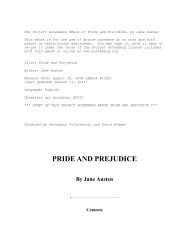pride
You also want an ePaper? Increase the reach of your titles
YUMPU automatically turns print PDFs into web optimized ePapers that Google loves.
"But what," said she, after a pause, "can have been his motive? What can have induced<br />
him to behave so cruelly?"<br />
"A thorough, determined dislike of me—a dislike which I cannot but attribute in some<br />
measure to jealousy. Had the late Mr. Darcy liked me less, his son might have borne with<br />
me better; but his father's uncommon attachment to me irritated him, I believe, very early in<br />
life. He had not a temper to bear the sort of competition in which we stood—the sort of<br />
preference which was often given me."<br />
"I had not thought Mr. Darcy so bad as this—though I have never liked him. I had not<br />
thought so very ill of him. I had supposed him to be despising his fellow-creatures in<br />
general, but did not suspect him of descending to such malicious revenge, such injustice,<br />
such inhumanity as this."<br />
After a few minutes' reflection, however, she continued, "I do remember his boasting one<br />
day, at Netherfield, of the implacability of his resentments, of his having an unforgiving<br />
temper. His disposition must be dreadful."<br />
"I will not trust myself on the subject," replied Wickham; "I can hardly be just to him."<br />
Elizabeth was again deep in thought, and after a time exclaimed, "To treat in such a<br />
manner the godson, the friend, the favourite of his father!" She could have added, "A young<br />
man, too, like you, whose very countenance may vouch for your being amiable"—but she<br />
contented herself with, "and one, too, who had probably been his companion from<br />
childhood, connected together, as I think you said, in the closest manner!"<br />
"We were born in the same parish, within the same park; the greatest part of our youth<br />
was passed together; inmates of the same house, sharing the same amusements, objects of<br />
the same parental care. My father began life in the profession which your uncle, Mr.<br />
Phillips, appears to do so much credit to—but he gave up everything to be of use to the late<br />
Mr. Darcy and devoted all his time to the care of the Pemberley property. He was most<br />
highly esteemed by Mr. Darcy, a most intimate, confidential friend. Mr. Darcy often<br />
acknowledged himself to be under the greatest obligations to my father's active<br />
superintendence, and when, immediately before my father's death, Mr. Darcy gave him a<br />
voluntary promise of providing for me, I am convinced that he felt it to be as much a debt of<br />
gratitude to him, as of his affection to myself."<br />
"How strange!" cried Elizabeth. "How abominable! I wonder that the very <strong>pride</strong> of this<br />
Mr. Darcy has not made him just to you! If from no better motive, that he should not have<br />
been too proud to be dishonest—for dishonesty I must call it."<br />
"It is wonderful," replied Wickham, "for almost all his actions may be traced to <strong>pride</strong>;<br />
and <strong>pride</strong> had often been his best friend. It has connected him nearer with virtue than with<br />
any other feeling. But we are none of us consistent, and in his behaviour to me there were<br />
stronger impulses even than <strong>pride</strong>."<br />
"Can such abominable <strong>pride</strong> as his have ever done him good?"<br />
"Yes. It has often led him to be liberal and generous, to give his money freely, to display<br />
hospitality, to assist his tenants, and relieve the poor. Family <strong>pride</strong>, and filial <strong>pride</strong>—for he



